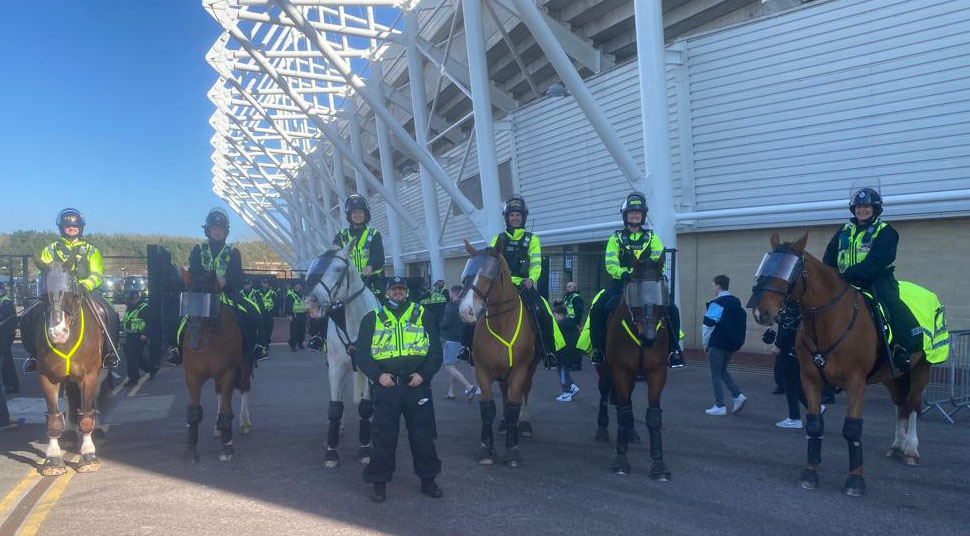To mark the start of this year’s World Autism Awareness Week, we share a blog by Superintendent Marc Attwell on how being autistic has helped him in his policing career
I’m Marc Attwell and I am a Superintendent in South Wales Police. I also happen to be autistic, or what used to be referred to as Asperger syndrome.
I, like Commander Dobinson from the Metropolitan Police and others, did not discover I was autistic until late in life. In fact I discovered I was autistic only a few short years ago.
I still remember it now: suddenly it made a lot of sense. All the things I had struggled with, and all of those I found easy, were explained to me by a consultant psychiatrist. While incredibly liberating, it was also upsetting as now there was a real reason as to why I was the way I was.
There is a common myth that those of us who are autistic lack empathy and don’t feel emotions. In fact, those of us on the autistic spectrum often care deeply about the feelings of others and ourselves. The problem is that we often struggle to make sense of the social cues, which are often very subtle, such as facial expressions, body language and other non-verbal communicators. For me, emotional intelligence is very much learnt, rather than being innate as it is with many of my colleagues.
Another common myth is that people on the autistic spectrum are geniuses. We might be, but invariably we’re not. The media is full of stories and films about the autistic savants: the chess prodigy or the mathematical geniuses à la Rain Man. What we do often have are intense interests and passions, and some of us make a career out of pursuing those passions.

An issue that I, like many adults who discover they are autistic late in life, had was that the system to diagnose is primarily geared towards children and mainly from an educational development perspective. For adults like I who had spent a lifetime developing ‘masks’ and systems to cope with living in a neurotypical world, the diagnostic tools used by psychiatrists aren’t where we need them to be, but things are improving.
For all the challenges I can sometimes experience, the benefits of being autistic far outweigh them and bring great benefits to my role as a senior leader in policing.
I have a very non-standard way of learning, which has at times caused great difficulties with the more traditional learn by rote methods still employed in some parts of policing. However I do find that providing that I am interested in a subject that I can pick it up and learn it very quickly and to a high standard.
I have a real passion for the detail and enjoy deep thinking. When our job is to examine how a system operates and how we as a police service can best protect our communities this is a real strength.
Like other police officers who are autistic, I have a fearless approach to decision making. This doesn’t mean that I am cavalier or take unnecessary risks. Instead, I am able to very swiftly distil the essential from the non-essential and form decisions whether that is leading a public order deployment as public order commander, as a Strategic Firearms Commander or making decisions about the corporate and organisational matters that are part of the daily business of being a senior leader in a Basic Command Unit.
Policing provides me with the environment I need to thrive as a person. I enjoy operating in chaotic environments but only so I can impose order and routine on them. I enjoy being organised and take great pride in noticing the detail that others often do not. These are all qualities that are prized in policing.
However, policing is still not without its challenges for me. I struggle in social situations and therefore the traditional interview processes can be overwhelming. I have to work hard to read peoples’ emotions and I struggle to sometimes understand the shades of grey that we sometimes have to operate in – something is either right or wrong to me.
Being aware of my condition allows me to manage this and to contribute fully wherever I can. It also allows my colleagues, friends and loved ones to understand me better.
I am proud to be wired different to most other people, and if you are wired differently too then I encourage you to be proud of that difference as well.
We can add so much more to policing if we are able to be ourselves and contribute our fullest potential.
Most police forces now have neurodiversity support networks and champions, and the National Police Autism Association isn’t just providing a place for those who are neurodivergent to gather, but also a national voice for improving policing for those within it, and for the communities that we have all sworn to protect. ∎
